 Coupla ugly items today:The life and times of PecadilloPecadillo
Coupla ugly items today:The life and times of PecadilloPecadillo leaves his car at
the Park and Ride, and from there he travels via carpool each day to the police academy. When he returned to the Park and Ride yesterday afternoon, his car had been broken into. The steering-column key-slot was clumsily ripped off in an attempt to steal the car. The miscreant who did the deed did it so
badly that it rendered the ignition switch inoperable.
Instead of stealing the car, then, the perp made off with Pecadillo's radio and CD player, the multiple-CD changer in the boot, Pecadillo's entire CD collection (about 100 CDs in a special case), and everything else of value in the car.
Well, everything except for Pecadillo's Mr. T® bobble-head, which was inexplicably left behind undamaged (perhaps because Pec has a potty-training award ribbon hanging on Mr. T's neck. Don't ask me what it means. I don't know.) So anyway, Pec is without transportation and (more tragically) his life is totally devoid of music at the moment.
Of course, he'd better not expect the folks at the police academy to cut him any slack. He won't be getting time off to sort things out with the insurance company. In fact, since Pec was involved in an incident that required a police report, he is most likely going to have a whole lot of extra paperwork to do.
It's a really good thing Pecadillo did not return to his car during the actual robbery carrying anything like
a frozen meat chub. I know Pecadillo. He once challenged a seminary student with a baseball bat when the poor guy accidentally set off the burglar alarm at Carey Hardy's house and the "intruder" didn't properly ID himself. (I'll let Pec write about that at
his blog someday.)
Anyway, I'm pretty sure Pec's normal instinct would be to challenge the perp, and if necessary employ said meat chub in a way that might have required some dentistry to repair the thwarted car-thief's grin. At the moment, however, Pecadillo could actually get in serious trouble for doing that. Recruit officers are strictly prohibited from intervening in any criminal incidents until they actually earn their badges. So for the next few months, Pecadillo has to be very cautious with the bad guys. One thoughtless meat-chub incident could cost him his whole career.
So it could have been worse, but it was bad enough. I hate when stuff like that happens.
The BlogwarRegarding
the Great Thanksgiving Blogwar: Yes, I agree it's
really ugly. Maybe not for all the same reasons everyone else says it's ugly. But it is definitely ugly.
I'm reluctant to say anything more about it at all. I'm pretty sure
whatever I say is going to get me in trouble. In fact, I haven't referred to the Blogwar in any context for some 48 hours or more—after I made a comment on one of the larger blogs trying to make a reasonable point and was angrily rebuffed by someone who, for good measure, also questioned my manhood—immediately
after the fellow had bemoaned the fact that the whole thing had got too petty and personal. (I'd link to the post in question, because it was a beaut, making an impassioned appeal to
Ephesians 4:29. But the author himself employed vulgar language to make that appeal. It wasn't the vilest possible profanity, but it was extremely crude and angry—and enough to violate the standard of what I am willing to link to.)
I decided at that point it would be prudent to bow out of the discussion without fanfare.
All of this is to say that the hypocrisy and histrionics on one side are every bit as ugly and blameworthy as the smug and arrogant tone those same folks are busily complaining about. It's also amazing to see so many people who claim to be absolutely outraged by public disagreement among Christians, but who nonetheless feel it prudent to dissect the whole business in an angry, slanted, and very public way.
I've watched at least two well-known bloggers publicly condemn the controversy at their own blogs, claim they were swearing off the dispute completely, and
then simply carry the fight to the comments section of another blog or two where the debate was still brewing. That's ugly.
And if you want to see something
really ugly, you should see a few of the private messages I have received in the past 48 hours. One person angrily declared me the chief culprit in the whole conflict, even though he admitted he hadn't actually read anything I have written.
He refuses to read me because I'm too closed-minded! A number of people have begged me to join the dogpile on Frank Turk, saying it's "obvious" that he is out of control. (Presumably this is "obvious" just because of the sheer number of people who are angry at Frank.) One or two other people have written to say they are angry with me because I won't simply "drop it." Apparently, they were so busy reading others' opinions about the conflict (and writing their own diatribes) that they didn't notice
I did actually drop it a couple of days ago. Still others have pleaded with me to end my silence and voice my disapproval for the way the people on
"my side" of the conflict are conducting themselves.
OK, since I'm apparently going to be blamed and criticized for the whole ugly incident no matter what I do or don't do, let me offer a very brief analysis of my own. I make no claim that I am perfectly objective, but I really am trying to be.
First: the penalty points against "my side":
- I wasn't happy with Frank Turk's title or tone on this post.
- If I were Frank, I wouldn't punctuate my points with expressions like "Booyah!"—especially after so many people are already angry. The advice given in Proverbs 15:1 and 25:15 is, I think, a sounder strategy for a conflict like this.
- I think the Fide-O post with the dead hawgs was predictably inflammatory. I therefore would not have posted those particular pictures at that moment. At a different time, they would have been somewhat amusing. But coming when it did, that post frightened even Darlene, who is naturally inclined to sympathy for "my side" and (after 27 years with me) isn't particularly squeamish.
- In retrospect, since what I intended to do was add some comedic final punctuation to (what I thought at the time was) the end of a blogfight, it turns out my comic-book tribute to Frank Turk was a tad premature. I did think it was essentially neutral and non-harmful to anyone in the conflict (there was no actual brunt of that "joke"). However, I clearly overestimated some folks' ability to appreciate the joke. For any pain and anguish my artwork may have caused people whom I love (which includes all y'all), I apologize.
- I think "my side" probably ought to work harder to treat serious issues as seriously as possible when conflict is involved, keeping the humor to a minimum, especially when it becomes obvious that the drollery is inflaming people's rage rather than lightening the mood.
I'll say this again, however: It's my candid opinion that raw histrionics, vulgar language, hypocritical fanning of the flames, the wrath of man, the supercilious contempt of people who thank God that they are not like the "TRs" (and who cannot pass up any opportunity, no matter how cheap, to take that shot just one more time)—and a lot of the other stuff from the "other" side—is every bit as reprehensible and just as bad a testimony to casual observers as everything people rightly
and wrongly judged "my side" guilty of.
And for the record, I do not think there is anything inherently or necessarily shameful in disagreement between Christians, even when it is expressed publicly and candidly. We of all people ought to love the truth that much.That said, I appreciate the fact that Frank Turk has not once lost his temper throughout this whole imbroglio. Whether you agree with him or not (and of course,
I do), he deserves credit for his patience, persistence, and even-temperedness. I also do think there's a real, significant, rational, biblical point in the stand Frank has taken this past week, and he summed it up well
right here, at a point in the conflict where I confess I would have found it pretty hard to be that restrained. I'm very glad to have Frank as my friend.
Bonus points also to
Jus Divinum, who joined the fray with some careful thinking and dispassionate wisdom at a key point in the discussion. Jus has probably argued longer and harder against some of my opinions than anyone else in the blogosphere, and I'd much rather have him on "my side" than arguing against me. Either way, he's usually worth listening to, and this was no exception.
I also appreciated
Steve Hays's contribution, but you already knew I would. I nearly always find his thoughts lucid and helpful. He is very pithy too, and I know that rubs some people the wrong way, but I was very glad he stepped into the fray when I'm pretty sure he would have liked to stay out of it.
I'm not so naive as to declare the whole imbroglio finally over once again. I
hope it is. We'll see. But I do want to add two more things:
- I really do think there were some vitally important points on the table at the start of this quarrel:
- The church does not need loose-cannon critics of the perpetually-cynical variety who are driven (to a conspicuous degree) by their own passions.
- Christians ought to evaluate everything with careful and critical discernment—but especially voices that are unrelentingly censorious and constantly shifting positions.
- Authentic "transparency" and "vulnerability" are not best expressed in fiction pieces.
- We ought to be wary of preachers who freely and gladly admit that their persona in the pulpit is different from the way they represent themselves elsewhere—especially when they declare the out-of-pulpit persona an honest and "vulnerable" expression of the real person.
- A person who taunts a critic shouldn't complain when he gets what he asked for.
- There's also an important point I hope someone will make at the end of all this: Real discernment is not a matter of evaluating everything by how it makes us feel. Often, the truth makes us uncomfortable. That's the way it is supposed to be. One of the real, serious dangers posed by the pervasive postmodern spirit is the tendency to treat "truth" as something determined in my own mind and heart from my unique perspective. Naturally, by that measure, whatever makes us uncomfortable isn't likely to be widely embraced. That's actually a dangerous form of sensuality, and it is a grievous sin, especially in the matter of discernment. It's disturbing to see how widespread that tendency is nowadays.
And that's all I have to say about that.
Another FracasSpeaking of pomoism,
Doug Wilson and
Andrew Sandlin have gotten into it over postmodernism—and it's a much more rollicking, more entertaining, and more enlightening fight than my little back-and-forth tussle with The Blue Raja in the comments threads here at
PyroManiac.
<joke>(Raja is bucking for a demotion to "irritating" in my blogroll, I think.)
</joke> Back in July, I put up a link to
the archive of Wilson's articles on pomoism, but the archive has grown considerably since then, and it's great stuff to read. A couple of side notes:
- F. J. DeAngelis has a chronicle of Sandlin's about-face in the pomo debate here.
- Sandlin posts an interesting quick first impression of Tom Wright's book The Last Word here.

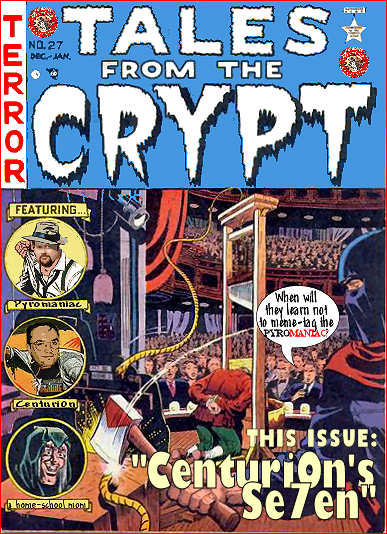




 Our forefathers were far less tolerant than we are, and it is to be feared that they were also more honest. It will be a sad discount upon our gain in the matter of charity if it turn out that we have been losers in the department of truthfulness.
Our forefathers were far less tolerant than we are, and it is to be feared that they were also more honest. It will be a sad discount upon our gain in the matter of charity if it turn out that we have been losers in the department of truthfulness.

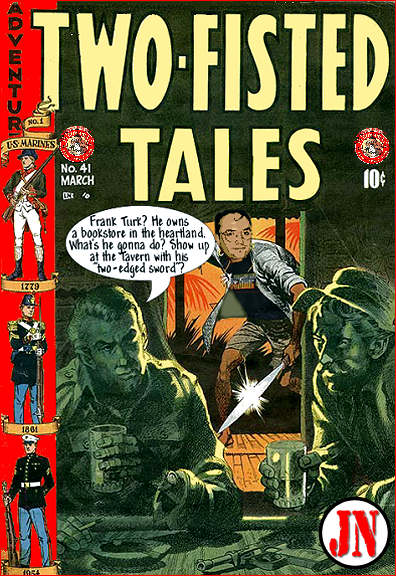




 All sorts of speculation has been going on about the revisions in my blogroll and What It All Might Mean.
All sorts of speculation has been going on about the revisions in my blogroll and What It All Might Mean. Your weekly dose of Spurgeon
Your weekly dose of Spurgeon
 As planned, Darlene and I had lunch Thursday with
As planned, Darlene and I had lunch Thursday with  Lunch was at Cheddars Casual Cafe on 71st street—one of my favorite Tulsa places. We swapped home-school-mom tales (Frank has some good ones) and gossipped about the blogosphere. I'm not going to get specific here, but if you're a regular reader, commenter, or blogger and wondering if we talked about you, the answer is yes. We talked about you all. For a couple of hours.
Lunch was at Cheddars Casual Cafe on 71st street—one of my favorite Tulsa places. We swapped home-school-mom tales (Frank has some good ones) and gossipped about the blogosphere. I'm not going to get specific here, but if you're a regular reader, commenter, or blogger and wondering if we talked about you, the answer is yes. We talked about you all. For a couple of hours. You know what? I'm too tired to write the next post in the "Modern Prophecy" series. I realize yesterday's post was about five times longer than optimum. (I probably should have held the Adrian Rogers anecdote out till today and made it a post on its own. If you skipped it because of the overflow of words yesterday, go back and read it.)
You know what? I'm too tired to write the next post in the "Modern Prophecy" series. I realize yesterday's post was about five times longer than optimum. (I probably should have held the Adrian Rogers anecdote out till today and made it a post on its own. If you skipped it because of the overflow of words yesterday, go back and read it.)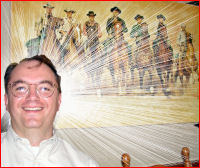 Speaking of Turk, I'm planning to have lunch with him today. Business brings him to Tulsa once a year, and today happens to be the day he had scheduled to be here this year. When he learned last week that I too would be in Tulsa, he tried to rearrange his schedule so he'd be in Memphis instead—but without success. I have bullied him into meeting me for lunch at a restaurant here in Tulsa. We're going to trade jokes about home-school moms.
Speaking of Turk, I'm planning to have lunch with him today. Business brings him to Tulsa once a year, and today happens to be the day he had scheduled to be here this year. When he learned last week that I too would be in Tulsa, he tried to rearrange his schedule so he'd be in Memphis instead—but without success. I have bullied him into meeting me for lunch at a restaurant here in Tulsa. We're going to trade jokes about home-school moms.
 The continuationists' response to this series of posts continues to amaze and amuse me. No matter how many times I point out that I am not making an argument for cessationism—not trying to make one; wasn't planning to make one; wasn't talking about the issue; did not even intend to bring it up when I began this series—we still have this flood of frantic comments from people who think cessationism is the issue and who demand to be given proof-texts so that they can dismantle whatever exegetical claims cessationism might rest on.
The continuationists' response to this series of posts continues to amaze and amuse me. No matter how many times I point out that I am not making an argument for cessationism—not trying to make one; wasn't planning to make one; wasn't talking about the issue; did not even intend to bring it up when I began this series—we still have this flood of frantic comments from people who think cessationism is the issue and who demand to be given proof-texts so that they can dismantle whatever exegetical claims cessationism might rest on.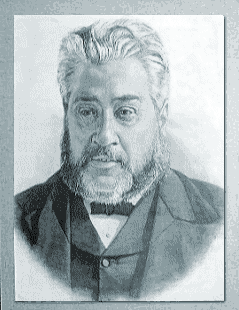 It is not for us to know the times and the seasons, and to be able to make a map of the future. There are some great events of the future very clearly revealed. The prophecy is not at all indistinct about the facts that will occur; but as to when they will occur, we have no data. Some think that they have; but our Lord here seems to say that we do not know the times and the seasons, and that it is not for us to know them.
It is not for us to know the times and the seasons, and to be able to make a map of the future. There are some great events of the future very clearly revealed. The prophecy is not at all indistinct about the facts that will occur; but as to when they will occur, we have no data. Some think that they have; but our Lord here seems to say that we do not know the times and the seasons, and that it is not for us to know them. Careful readers ought to have noticed (because I have emphasized this fact repeatedly) that I have not yet posted a single argument in favor of cessationism. I really haven't dealt with the issue yet at all.
Careful readers ought to have noticed (because I have emphasized this fact repeatedly) that I have not yet posted a single argument in favor of cessationism. I really haven't dealt with the issue yet at all. As a matter of fact, I would like to reiterate something I said earlier: When I brought up this subject of prophetic-utterances-gone-bad in the first place, I wasn't trying to pick a fight with my charismatic readers. I originally had no intention of even getting into the issue of cessationism. I think I have much more in common with my "Reformed non-cessationist" brethren than I have with liberal cessationists. And oddly enough, the main targets I was originally planning to take on were non-charismatics like Henry Blackaby and the Gothardites.
As a matter of fact, I would like to reiterate something I said earlier: When I brought up this subject of prophetic-utterances-gone-bad in the first place, I wasn't trying to pick a fight with my charismatic readers. I originally had no intention of even getting into the issue of cessationism. I think I have much more in common with my "Reformed non-cessationist" brethren than I have with liberal cessationists. And oddly enough, the main targets I was originally planning to take on were non-charismatics like Henry Blackaby and the Gothardites.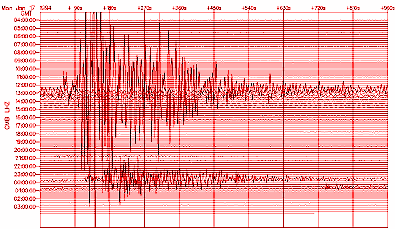
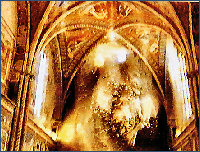 But they weren't really catastrophic events (unless you count the 6.8 quake at Assisi, in September of '97, which killed 10 people and destroyed some ancient frescoes on the ceiling of the Franciscan basilica there. By the way, that one struck within an hour after I had flown into Italy, while Carey Hardy and I were literally standing at our hotel's front desk, checking in.)
But they weren't really catastrophic events (unless you count the 6.8 quake at Assisi, in September of '97, which killed 10 people and destroyed some ancient frescoes on the ceiling of the Franciscan basilica there. By the way, that one struck within an hour after I had flown into Italy, while Carey Hardy and I were literally standing at our hotel's front desk, checking in.) It also occurred to me that if I were a charismatic charlatan, I could have parlayed my connection with the earthquakes into big-time fame and credibility, simply by inventing whatever "prophetic" significance I wanted to imagine and claiming the earthquakes were divinely-inspired punctuation marks for my prophecies. After all, I had multiple witnesses to my presence in all six earthquakes. The one in Queenstown, New Zealand, occurred while I was preaching about Jonah, right after I had made an emphatic point about God's sovereignty over the forces of nature.
It also occurred to me that if I were a charismatic charlatan, I could have parlayed my connection with the earthquakes into big-time fame and credibility, simply by inventing whatever "prophetic" significance I wanted to imagine and claiming the earthquakes were divinely-inspired punctuation marks for my prophecies. After all, I had multiple witnesses to my presence in all six earthquakes. The one in Queenstown, New Zealand, occurred while I was preaching about Jonah, right after I had made an emphatic point about God's sovereignty over the forces of nature.
 I spent all day yesterday (Wednesday) in an orientation seminar with
I spent all day yesterday (Wednesday) in an orientation seminar with  Incidentally, when he was a little kid, Pecadillo was the least literate of all our sons. He hated every minute of school. He struggled with learning how to read. His two elder brothers loved Sesame Street and learned the alphabet and basic reading skills before entering kindergarten. Pecadillo's tastes ran to the Three Stooges, and he didn't read anything voluntarily until late Junior High, when someone gave him a biography of Curly. He was the least likely person in our family to blog. He started his blog quietly, without even mentioning it to me, while Darlene and I were out of town a few months ago. I have been amazed by his latent literary abilities. It took me completely by surprise. I honestly don't know when and where he developed his writing skills, but—wow.
Incidentally, when he was a little kid, Pecadillo was the least literate of all our sons. He hated every minute of school. He struggled with learning how to read. His two elder brothers loved Sesame Street and learned the alphabet and basic reading skills before entering kindergarten. Pecadillo's tastes ran to the Three Stooges, and he didn't read anything voluntarily until late Junior High, when someone gave him a biography of Curly. He was the least likely person in our family to blog. He started his blog quietly, without even mentioning it to me, while Darlene and I were out of town a few months ago. I have been amazed by his latent literary abilities. It took me completely by surprise. I honestly don't know when and where he developed his writing skills, but—wow.  Last night I started the process of ripping all my Bach cantatas. Bach's cantatas are without a doubt the finest anthology of sacred music ever produced by a single composer. (How did Protestants ever get from Bach to the insipid stuff we call "worship choruses" today?)
Last night I started the process of ripping all my Bach cantatas. Bach's cantatas are without a doubt the finest anthology of sacred music ever produced by a single composer. (How did Protestants ever get from Bach to the insipid stuff we call "worship choruses" today?)